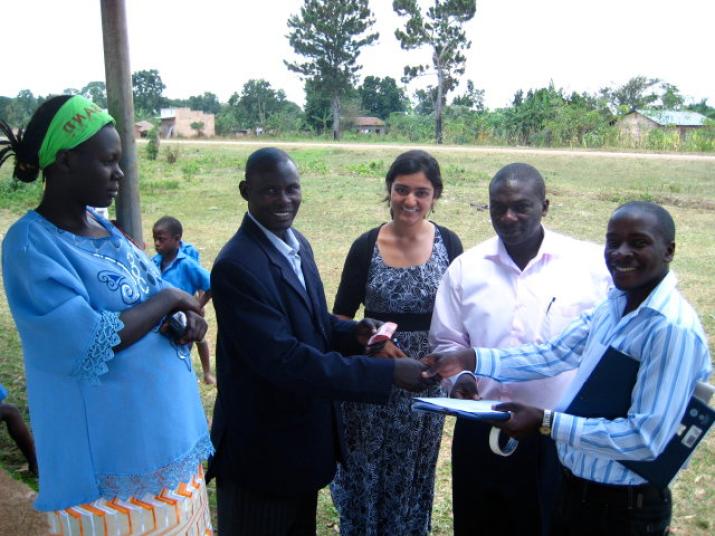
Sneha Shah is the first recipient of the Aalok Modi Global Health Fieldwork Fund. She worked in Uganda.
Published November 23, 2010, last updated on June 3, 2020 under Education News
Students often describe their fieldwork experience through the Duke Global Health Institute as a defining moment in their time at Duke. The experience helps them gain a deeper understanding of the complex global health challenges that exist today as well as grow as a global health scholar.
Since 2008, DGHI has supported 206 students doing global health fieldwork through grants, DGHI field placements, faculty mentoring and the global health certificate program. From community health and development in India and tuberculosis control in North Carolina, to telemedicine in Brazil and HIV/AIDS prevention in China – DGHI’s fieldwork projects run the gamut of health issues and locations around the globe. The program also incorporates all levels of education, from undergraduates, to medical, graduate and doctoral students.
As the first recipient of the DGHI-administered Aalok S. Modi Global Health Fieldwork Fund, Junior Sneha Shah worked with community members and business owners in Naama, Uganda last summer to develop and implement a pilot emergency medical insurance system that provides fast and efficient transportation to the local hospital and promotes planning for emergencies such as childbirth. With a special focus on maternal health, Shah’s aim for the project was to address the area’s high rate of preventable deaths among child-bearing women. She describes her experience as transformative.
“I grappled with a lot of questions of purpose and how to respond to setbacks in the beginning,” said Shah, “and I emerged from this experience with more clarity, understanding, receptiveness and passion for all the elements surrounding the kind of life I want to lead—a life dedicated to service.”
Soon after arriving to Uganda, Shah realized that her role was to serve as a catalyst for change, rather than simply trying to ‘fix’ the area’s high maternal mortality rate, which was insurmountable. Adapting her project slightly, she drew from the wisdom and desire of community members to improve their own health and focused on piloting an effort that could become a sustainable solution. “They have so many ideas, they know the community better, and they are in a much better position to sustain the efforts,” said Shah. “The resources were also available; we were simply the link between the two and the facilitators of change for what they deemed was a necessary step forward for the community.”
Before the summer ended, Shah enrolled her first participant into the program. “On August 30th, a woman used the insurance to travel to the hospital for the delivery of her baby, Elizabeth. Both the baby and mother are healthy, and we view this event as a wonderful first success,” said Shah, an economics major who plans to attend medical school and one day hopes to influence policy issues related to access to health care.
With a similar focus on maternal health and issues of access, Duke medical student Kaitlin Rawluk completed her DGHI-funded fieldwork project in Copan, Honduras last summer, where she developed recommendations that encourage more women to make use of the local birthing clinic instead of risking delivery complications at home. Rawluk surveyed 112 new mothers and pregnant women in the community to determine their birthing preferences, utilization of and confidence in clinic services, and potential barriers to accessing care.
“When given a choice, most women would prefer to have a doctor and be in a clinic, so the question really becomes why are 60% of women in the community still giving birth at home,” said Rawluk, who is also a master of public health student at UNC-Chapel Hill. “I gained a lot of insight into some of the realities they faced hindered them from accessing care.”
Rawluk’s survey found that most women cited distance, time, transportation and cost as the main barriers to accessing care and other emergency services at the birthing clinic. She also learned that women who lived farther away and had less education generally had more confidence in midwives. Among her recommendations, Rawluk proposed a microcredit or voucher system to raise funds or share costs within the community as well as an educational campaign to promote better utilization of clinic emergency services during prenatal care appointments.
“I’m at the point in my training where I was able to apply some of the skills I am learning as a medical student and public health student to do a project that the community asked for and would have an impact and,” said Rawluk, who previously did fieldwork in rural North Carolina and Oaxaca, Mexico. “This time, instead of just learning, I was able to give back.”
Originally, Rawluk’s project was intended to focus on medical record analysis. But after hearing concerns from clinic staff that their emergency services were not being fully utilized, she expanded her scope of work to include a survey of birthing preferences and practices in addition to the medical record project.
As with Sneha Shah, it is this kind of adaptability and collaboration with community partners that paves the way for a meaningful global health field experience, a defining educational experience and the opportunity to make a lasting contribution in an underserved community around the world.
Junior Sneha Shah worked with community members and business owners in Naama, Uganda last summer to develop and implement a pilot emergency medical insurance system that provides fast and efficient transportation to the local hospital and promotes planning for emergencies such as childbirth.


